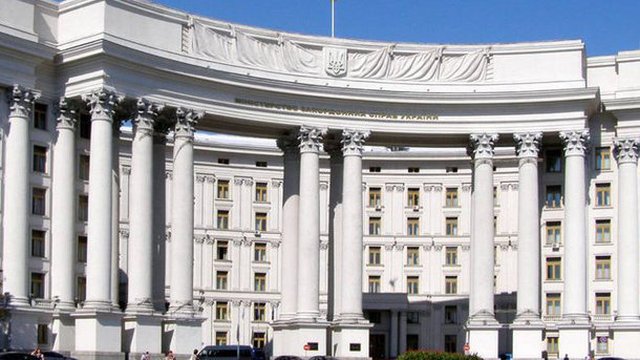Coercive passportization is element of repressive policy of aggressor state towards citizens of Ukraine – MFA

Coercive passportization is an element of the repressive policy of the aggressor state towards the citizens of Ukraine, who are forced to live under occupation, it is also an element of the well-planned and cynically implemented systemic pressure of the Russian occupation administration on the citizens of Ukraine, the Foreign Ministry of Ukraine said in its statement.
"In the recent days, we witness an artificial campaign regarding the Russian passports, which the Russian occupation administration in Crimea has coercively imposed on Ukrainian citizens since March 2014. Coercive passportization is an element of the repressive policy of the aggressor state towards the citizens of Ukraine, who are forced to live under occupation. Since the illegal occupation and the attempted annexation, Russia has been flagrantly violated both Ukrainian and the international law," the MFA statement posted on its official website on Tuesday reads.
As it is noted the Law of Ukraine "On Ensuring Civil Rights and Freedoms, and the Legal Regime on the Temporarily Occupied Territory of Ukraine" of April 15, 2014 clearly states that coercive automatic citizenship acquired by the citizens of Ukraine residing on the temporarily occupied territory is not recognized by Ukraine and does not constitute grounds for losing the citizenship of Ukraine. Article 45 of the Regulations on the Laws and Customs of War on Land, approved by the Fourth Hague Convention of 1907, prohibits coercion of the population of the occupied territories to swear an oath of allegiance to the occupying power and, consequently, to forcibly change the citizenship.
"The imposed passportization is also an element of the well-planned and cynically implemented systemic pressure of the Russian occupation administration on the citizens of Ukraine. Citizens of Ukraine residing in the Autonomous Republic of Crimea and the city of Sevastopol were in fact deprived of their right to choose," the ministry stressed.
The ministry also notes that opportunities to give up the Russian citizenship were strictly limited by the lack of the relevant passport centers and very short deadlines for applications for renunciation of citizenship. Moreover, if case of refusal to obtain Russian passports, the rights of the residents of Crimea to employment, medical care, social benefits and pension were artificially restricted. The absence of a Russian passport could also has led to forced deportation from the peninsula and an entry ban into the territory of the Autonomous Republic of Crimea and the city of Sevastopol.
The threat of persecution of the pro-Ukrainian activists, including journalists, by the occupying power was an integral aspect of automatic passportization. The history of the occupation showed that the residents of Crimea had every reason to fear that through filing applications for renunciation of Russian citizenship, the occupation authorities would identify the opponents for further repressions.
The Ukrainian Foreign Ministry noted that citizens of Ukraine were forced to obtain Russian passports in order to preserve their own homes and property on the occupied peninsula as well. The recent President Putin decree, which deprives Ukrainian citizens to own land lots in the temporarily occupied Crimea is another step towards imposing Russian citizenship and a gross violation of international law, the statement reads.
"Ukraine will protect the rights and interests of Ukrainian citizens living under the occupation in the Autonomous Republic of Crimea and the city of Sevastopol. Crimea is Ukraine," the ministry stressed.










